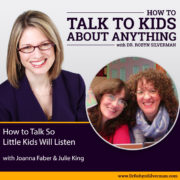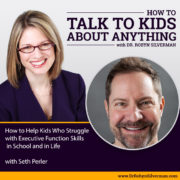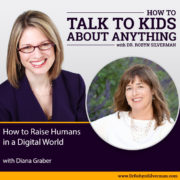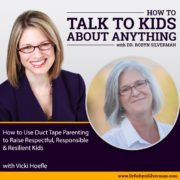How to Talk So Little Kids Will Listen with Joanna Faber & Julie King- ReRelease
Special guests: Joanna Faber & Julie King. What do you do with a little kid who won’t brush his teeth? Screams in his car seat? Pinches the baby? Refuses to eat her vegetables? Throws books at the library and runs rampant in the restaurant? We’ve all been there. How many of us have seen the parent with the child at the supermarket who is throwing one big tantrum in the cereal aisle because s/he won’t buy the super sugar rainbowloops that he had to– HAD TO– have? How many of us have BEEN that parent with that child? No judgment- we are here to discuss it and get some strategies and scripts to all parents who have ever had some trouble with their young kids.
Many of you who are hungry for parenting and teaching knowledge probably know the blockbuster best-selling book, How to Listen So Kids will Listen and Listen so Kids Will Talk by Adele Faber and Elaine Mazlish. It’s a staple on my shelf. Well, Adele Faber has a daughter, Joanna Faber who not only grew up being the recipient of all the strategies Faber and Mazlish described in their mega-bestseller, but also wrote a follow up book with her childhood best friend, Julie King that takes a similar structure, using common challenges of young children and provides tool after tool to help anyone with children ages 2-7.
Joanna Faber and Julie King are the authors of How To Talk So Little Kids Will Listen: A Survival Guide to Life with Children Ages 2-7 (Scribner 2017). The book has been ranked #1 as a best-seller on Amazon, and is being translated into 17 languages world-wide. Joanna and Julie created the soon-to-be-released app Pocket Parent, a companion to their book, as well as the app Parenting Hero. Joanna and Julie lead workshops online and in person, consult privately and give lectures in the U.S. and internationally. Visit them at HowToTalkSoLittleKidsWillListen.com or on Facebook.







